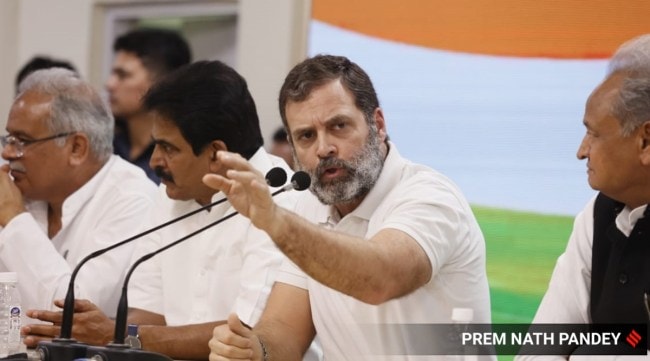Opinion Rahul Gandhi’s disqualification as MP: It highlights the defects of the Supreme Court’s verdict in the Lily Thomas case
Political leaders can be accused of criminal offences, many of which may not be valid. Verdict in Lily Thomas case removed a sitting MP’s safeguard against disqualification
 Rahul Gandhi at the press conference on Saturday (Express photo by Prem Nath Pandey)
Rahul Gandhi at the press conference on Saturday (Express photo by Prem Nath Pandey) The lessons from the Surat court’s conviction in the defamation case against Rahul Gandhi are political, not legal. With the immediate and abrupt notification of his disqualification by the Lok Sabha Secretariat, democracy in India seems to have hit a new low. This attack on free speech has happened in an atmosphere of hate speech across the board.
It is apolitical and unrealistic to compare the present case with the fate of leaders like J Jayalalithaa, Azam Khan or Lalu Prasad Yadav. It is an unprecedented situation of punishing and disqualifying a prominent Opposition leader for what he said in public.
A frivolous complaint, which normally should have been thrown out at the threshold, has resulted in a conviction that has led to the disqualification of a member of Parliament. The sentence imposed is the maximum possible, as per Section 500 of the Indian Penal Code (IPC). On the face of it, the sentence is unjust, disproportionate, and harsh. More significantly, it could have a chilling effect on those who dare to question the state or those who run it.
As a practising lawyer, this writer has never come across a situation where a court has convicted an accused for the maximum jail term of two years in a defamation case, however serious. That might have happened only very rarely. In Rahul Gandhi’s case, the conviction and the sentence were imposed after the court judicially took note of his position as a member of Parliament. It is, therefore, clear that the court, while delivering the judgment, was mindful of the consequences like disqualification that can follow, if not prevented by an order by a higher court.
This shows the egregious folly of the celebrated judgment in the Lily Thomas Case (2013). If one takes a pure legalistic view, even the country’s freedom movement could be termed as offences under the Indian Penal Code, a perception that will straight away be rejected by history. Political leaders could be accused of criminal offences for a variety of reasons and many of them might not be valid or acceptable. There have been clear instances of malicious prosecution and victimisation in the realm of politics. Coupled with this, there is the possibility of erroneous judgments by the courts, especially those at the subordinate level. This is the basic realism behind Section 8(4) of the Representation of the People Act,1951, as enacted. Though Subsections (1) to (3) of Section 8 of the Act contemplated disqualification on conviction in criminal cases, the filing of an appeal or revision petition within three months was enough to avert the danger of disqualification as per Section 8(4) of the Act. But in Lily Thomas V. Union of India, the Supreme Court has practically rewritten the statutory provision by removing this safeguard, leading to a situation where a conviction by a local court in the country can fence out a political leader from the legislative bodies. This is clearly devoid of democratic legitimacy. Rahul Gandhi’s conviction illustrates the imminent danger in Lily Thomas, which was blindly celebrated as a revolutionary verdict against “criminalisation of politics”, even by several legal luminaries. The verdict lacked a sense of ground realities in an electoral democracy. The judgment was a textual interpretation of Article 102 and Article 191 of the Constitution, dealing with disqualification. It did more harm than good to the system.
A dilemma has been created in legal circles on how Article 103 of the Constitution will impact the disqualification process, now that Rahul Gandhi has been disqualified without even a formal order by the President or without resorting to the procedure as stated in this Article. According to this provision, a presidential decision is necessary to disqualify a member of either House of Parliament. This again should be based on an opinion of the Election Commission which the President is bound to obtain. However, the implication in Lily Thomas about the automatic disqualification does not seriously consider this constitutional scheme of things, though there is a reference to Article 103 in the judgment. The decision in Lily Thomas is also against a three-judge bench ruling in Consumer Education and Research Society V. Union of India (2009). In the latter, the Court said that the vacancy of a member of the House “occurs only when the President decides and declares the disqualification under Article 103”. Clearly, the Lok Sabha Secretariat’s decision is not in tune with the three-judge bench’s decision.
The verdict could also pose disturbing questions relating to the validity and legitimacy of provisions relating to criminal defamation. A well-researched plea challenging the constitutional validity of Section 499 and 500 of the IPC dealing with criminal defamation was turned down by the Supreme Court in Subramanian Swamy V. Union of India (2016). The present episode illustrates the dangerous effect that the provisions on defamation can have on opposition voices.
The conviction, sentence and disqualification in this case are wrong, unjust, and unfair. Anything unfair is also undemocratic, in the constitutional sense.
The writer is a lawyer at the Supreme Court of India



